- Lifestyle & Sports
- 13 Jan 25
Best of Dublin - A DUG's Life - DUG

With their inspired blend of Americana and Irish folk, DUG have been making huge waves in Dublin, selling out venues left and right. They tell Caroline Kelly how they made it happen, and reflect on the ongoing boom in Irish trad.
Elaborations and deconstructions of the transatlantic folk scene make up the core of DUG, the Dublin-based duo comprising California native Jonny Pickett and Scottish-born Lorkin O’Reilly, who spent a good bit of the last decade in upstate New York. In a relatively short timespan, they’ve gone from strength to strength, having emerged in Dublin as a fully-formed outfit after years of solo work.
The duo’s infectious blend of Irish trad and Americana has led them to sell out venues all across Dublin, despite having less than a handful of releases to their name. Their busking set drew heaving crowds on a daily basis, making them a popular fixture on Grafton St.
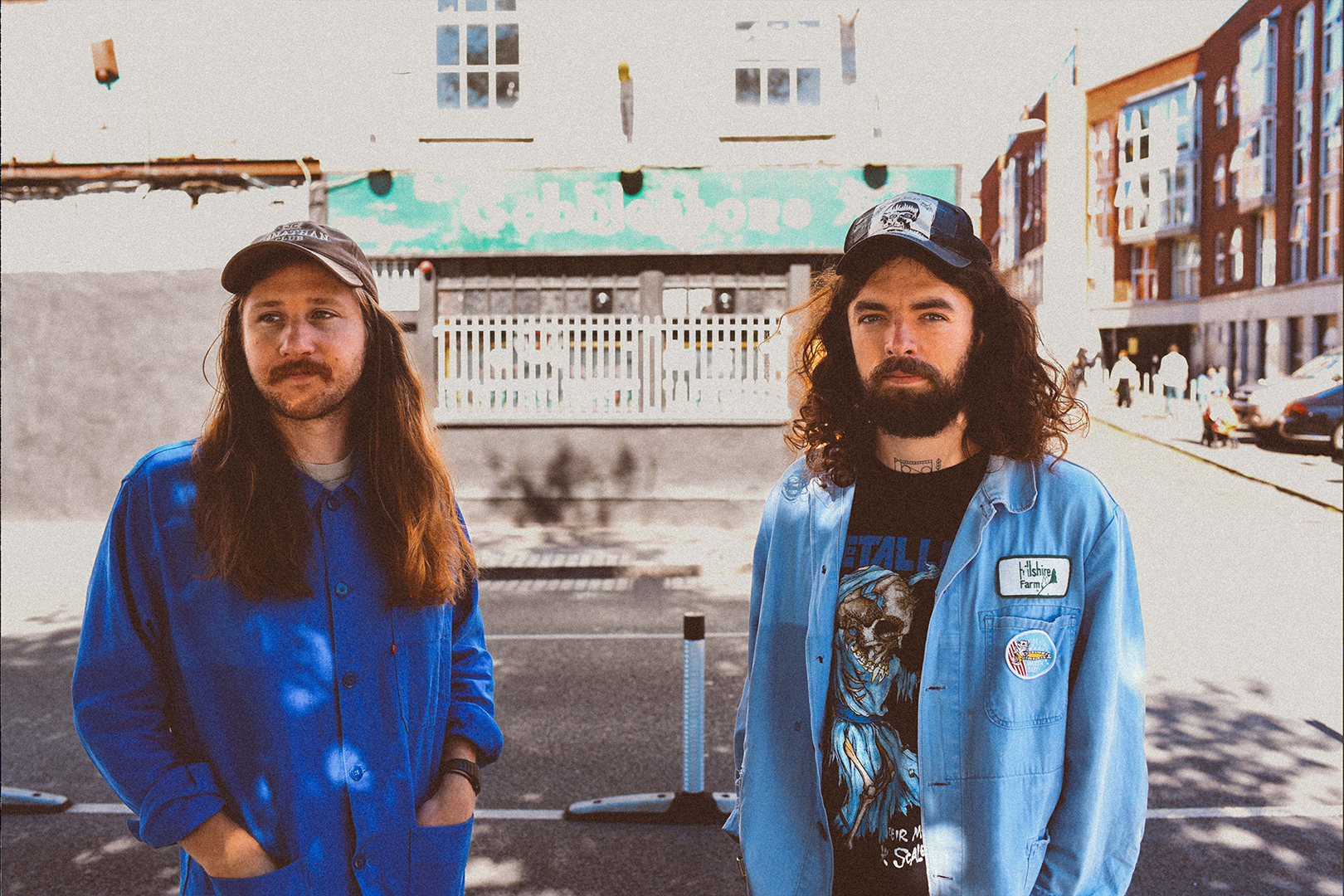 DUG. Copyright Miguel Ruiz.
DUG. Copyright Miguel Ruiz.DUG’s first single, ‘Jubilee’, became something of a post-Covid anthem, toasting the better days ahead. In the utterly joyous hook, they sing, “Can’t you feel it, can’t you see / It’s the year of Jubilee”. The release of the banjo-driven track was a landmark moment for a genre enjoying a celebrated renaissance.
Having introduced themselves last October, DUG are keen to reflect on their whirlwind early days. But, like any good story, it took a bit of prologue to get to where they are now. An abiding appreciation for Irish trad music fostered Jonny’s dreams to immerse himself in the local Dublin scene. As such, the clawhammer banjo player packed his bags and left the sunlit coastlines of Southern California.
“I moved here in 2016 because I really wanted to get into trad,” he says, “even though I couldn’t play it. So I did a masters in music at UCD.”
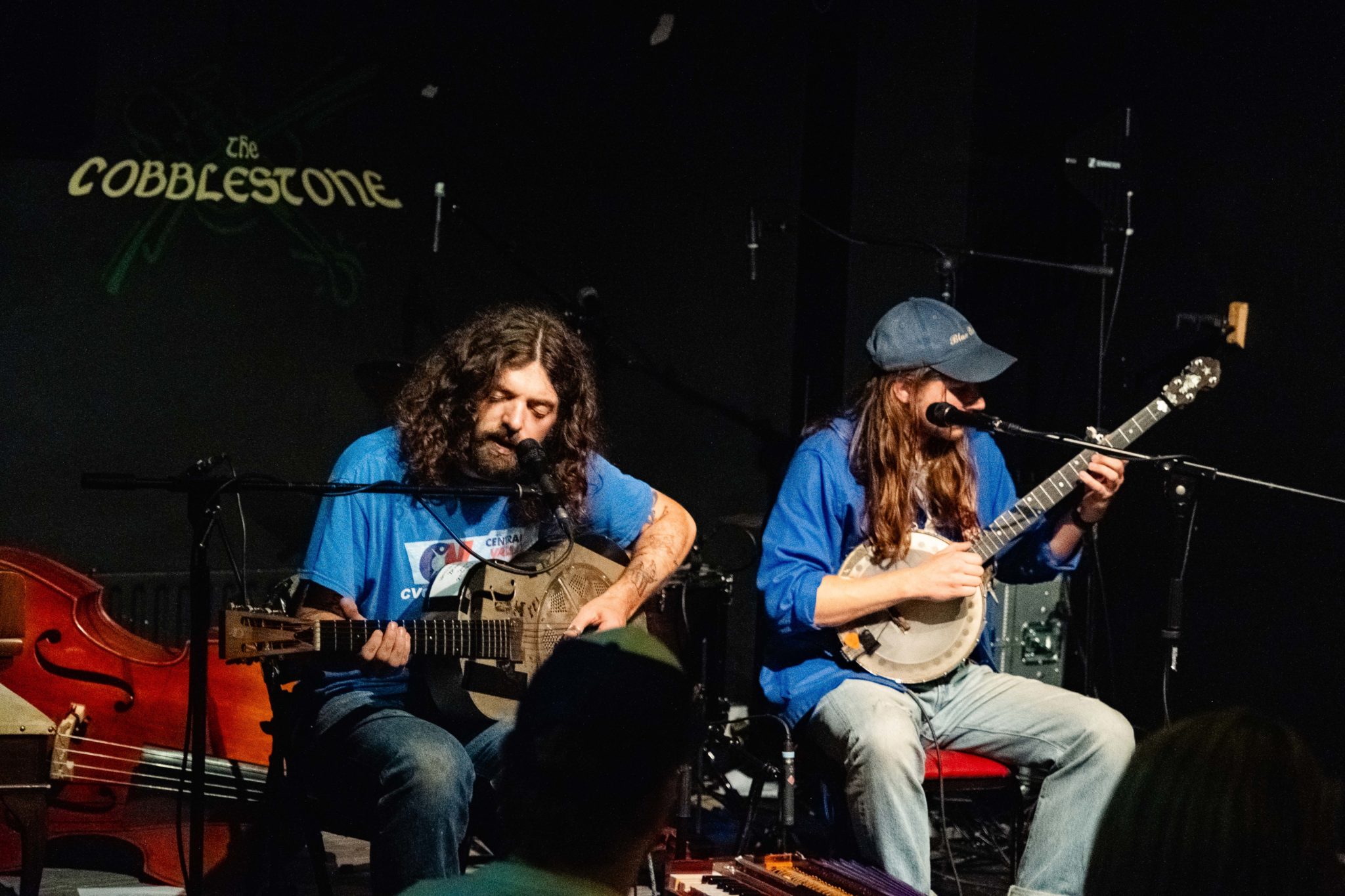 DUG at the Cobblestone / copyright Patrik Meier/hotpress.com
DUG at the Cobblestone / copyright Patrik Meier/hotpress.comA short visit in 2021 influenced Lorkin’s move to Dublin. He quickly found his way into the local folk circles, where he met Laura Quirke, one half of the folk duo Lemoncello.
“That was a really magical time,” he reflects. “Laura was filming this beautiful short film she made called Devotion. It was filmed at Hyne’s in Stoneybatter. The Mary Wallopers were playing as the session band. I met Jordan O’Leary [of The Scratch] and loads of other Dublin musicians. Jonny was there, he mastered some of the music for the film.
“It had this post-Covid party atmosphere to it. Everyone was just really excited to be doing things. I went back to New York after that weekend and decided I was going to move to Dublin, which I did about four months later.”
After a series of serendipitous encounters – over coffee at Mad Hatter’s in Stoneybatter, kebabs at All Together Now and sauna sessions at Inspire Fitness Cabra – the pair started playing together and soon realised their undeniable sonic chemistry. Lorkin spent much of 2022 hanging out in Jonny’s gaff, where they began writing songs together.
BUSK OR BUST
Everything started to fall into place, and by October 2023, the pair unveiled DUG. Their unique foray into the trad scene started with busking in the city centre, which was pivotal.
“Busking was a big game changer for us. We didn’t necessarily want to play bar gigs to get started,” Lorkin tells me. “There’s a time and place for playing for several hours in a bar, and we both felt like we didn’t want to go back there again. We wanted to be home to cook dinner by 5pm. It was unreal. It’s truly a golden age for busking at the moment. People say it’s dead and you need a licence. But you can actually pay your rent by busking and then some!”
The lads quickly made a name for themselves on the streets and among the local trad scene. They sold out Whelan’s Upstairs twice before ever releasing music together, due in large part to their rounds on the busking circuit, which boosted their word of mouth. But what gave Lorkin and Jonny the space to truly blossom as artists was the tight-knit folk scene and guidance from its sage heavyweights.
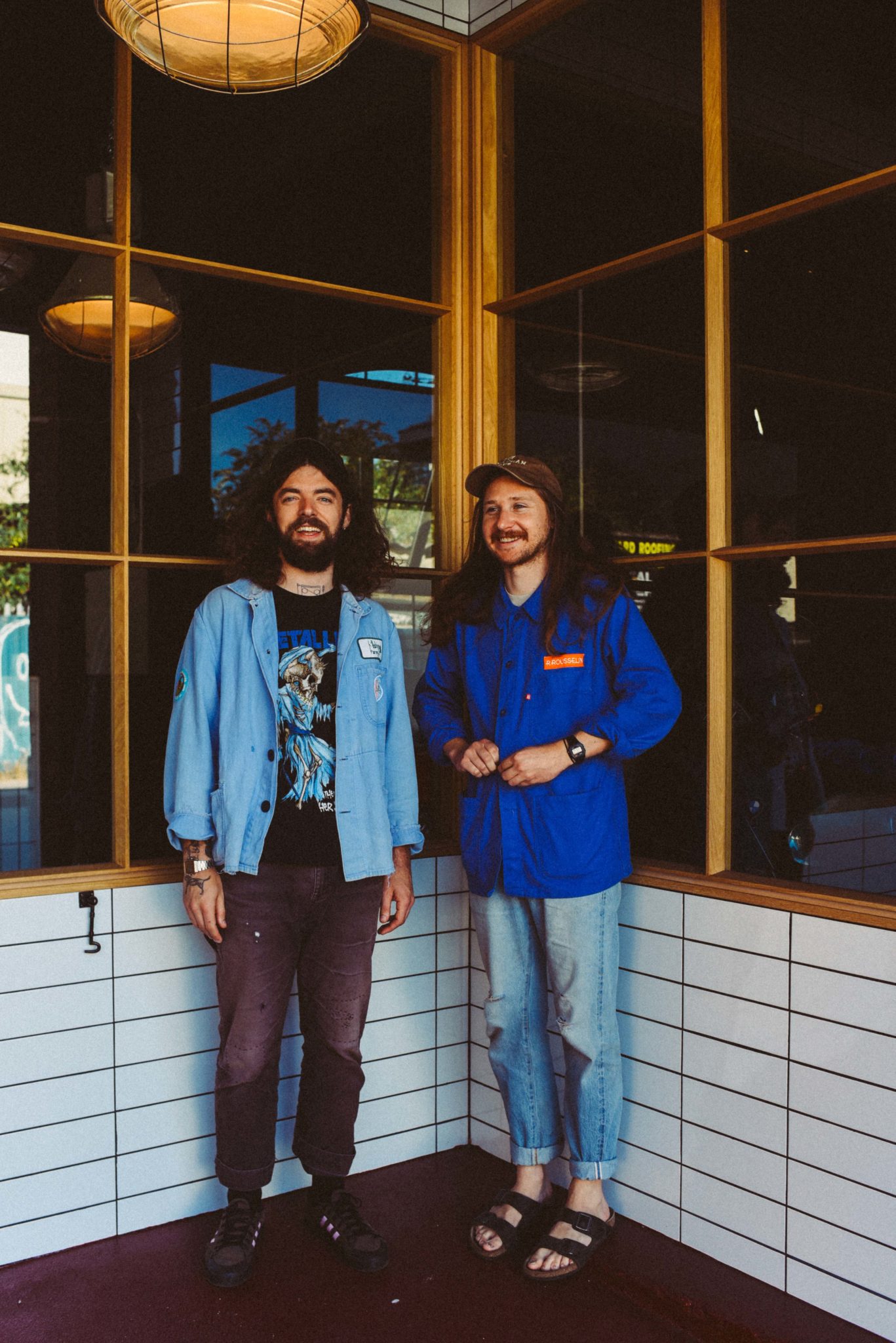 DUG. Copyright Miguel Ruiz.
DUG. Copyright Miguel Ruiz.Belfast folkster Joshua Burnside lent his production chops to their debut single ‘Jubilee’. For their secondrelease, ‘Big Sundown’, DUG enlisted Diarmuid Mac Gloinn, of Ye Vagabonds fame, on backing vocals. The names of fellow artists crop up often, as it becomes apparent that the community is at the very core of not only what inspires creation, but what grants them a sense of belonging.
“It’s truly a golden age for busking at the moment. People say it’s dead and you need a licence. But you can actually pay your rent by busking and then some!”
“That’s the benefit of having friends who have been in bands for 10 years,” offers Lorkin. “The trad community is a huge resource. People are always willing to offer their time and advice. I don’t think I felt that so much in other places, you know? The community really has each other’s best interests in mind.”
“There’s a real sense that everybody wants the scene to do well,” Jonny acknowledges, “because they recognise that it’s mutually beneficial for everybody if the music scene is healthy and people are doing big, cool and interesting things. When everyone is doing well, people really start to notice.”
GOLDEN AGE
A question that remains is the best places to catch Dublin trad sessions. Whether you’re an aficionado or neophyte, the lads have devised a road-tested instruction manual for checking out the local scene.
“Alright, so you gotta start with the basics,” Jonny asserts, assuming a business-like pose. “Begin at level one and just get down to The Cobblestone. You could stay there forever and you’ll always get good music.
“Level two: head over to Walsh’s in Stoneybatter on either Sunday or Monday night. You can’t beat it. Level three: you get into the niche ones. The Old Royal Oak has fantastic trad music. There’s a guy called Neil Murray who does a session over there. He’s incredible.
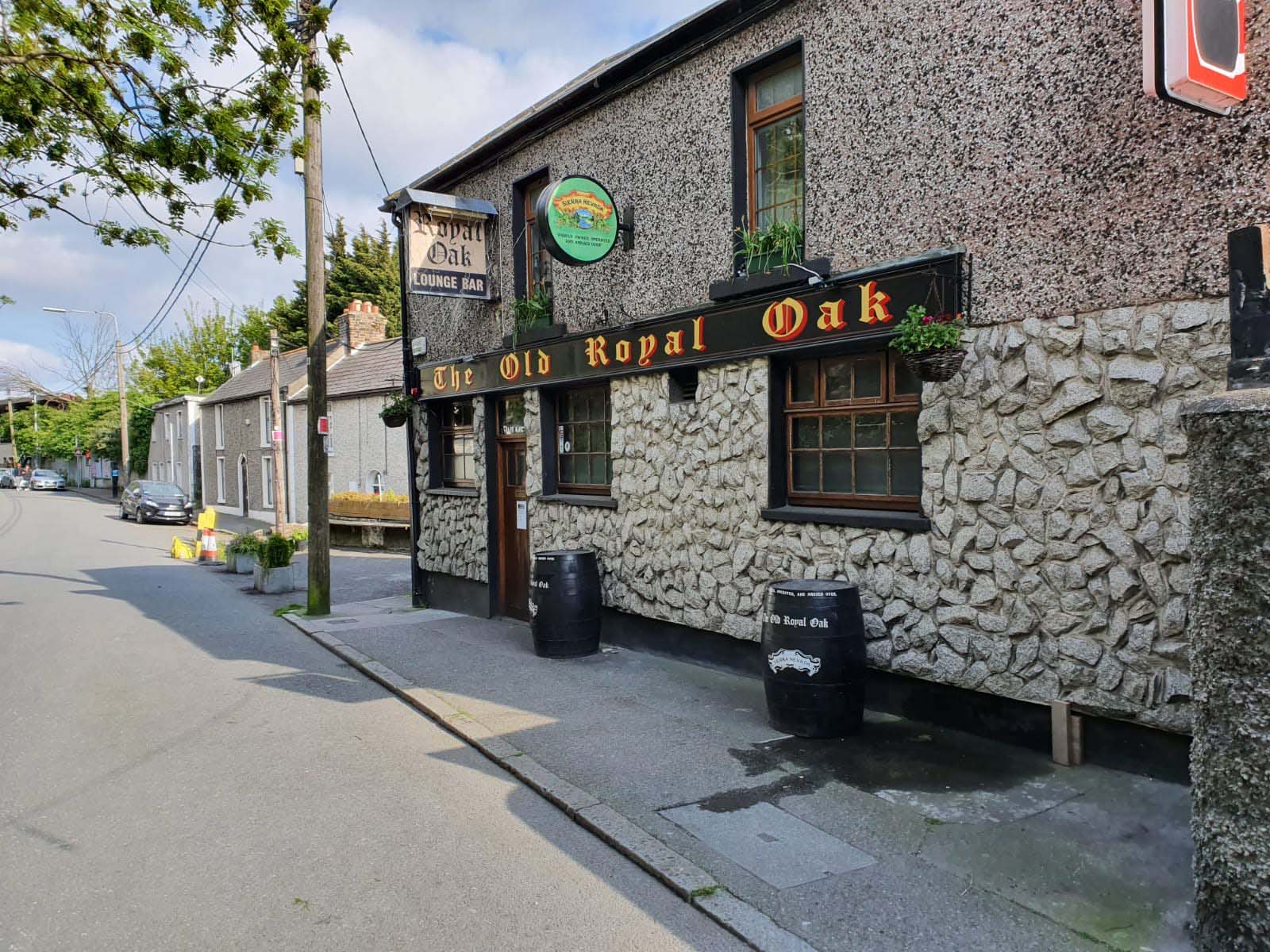 The Old Royal Oak
The Old Royal Oak“Think of it this way: if Stoneybatter is a house, Walsh’s is the sitting room. It’s a common space where the locals gather. It’s been like this for years. If you’re there on a Wednesday, you’ve got to check out Varo, the trad duo. They play fiddle and sing. They’re awesome.”
The golden age of Irish folk is certainly still unfolding, with Dublin the community’s sprawling epicentre. There’s the experimental, reimagined balladry of John Francis Flynn; Eoghan Ó Ceannabháin, who suffuses the sean-nós tradition with fierce activism and social criticism; and Lankum, the Ivor Novello-nominated quartet, whose apocalyptic folk musings have stretched to the farthest reaches of the globe. Seeds for the resurrected folk boom were sown by artists looking to reinvigorate tradition with modern sensibilities. DUG’s distinct blend of traditional airs and protean bluegrass riffage have made them a highly sought-after export as well.
“Trad is doing so well because of the vast amount of small to mid-tier venues, which are unbelievably helpful for getting people noticed.”
The vast network of performance spaces in Dublin, coupled with the government’s investment in the arts, have also helped grease the wheels of the folk resurgence.
“Honestly, trad is doing so well because of the vast amount of small to mid-tier venues, which are unbelievably helpful for getting people noticed,” Jonny says. “I also feel the government is just pumping money into the music scene. We’re really lucky that our friends, us included, have gotten funding. It all trickles down. If your friend gets a lot of money for a project, they’re gonna hire their friends.”
“Like Jonny said, the massive amount of small venues is amazing,” Lorkin adds. “There’s also a lot of venues which have somewhat built-in audiences around the city, which is super helpful for the community. The Cobblestone is a prime example of that, same with Walsh’s or even something bigger like Vicar Street. People trust that these venues will bring good music. That’s just the infrastructure at a micro level, and it’s so key to helping artists. It goes a long way.”
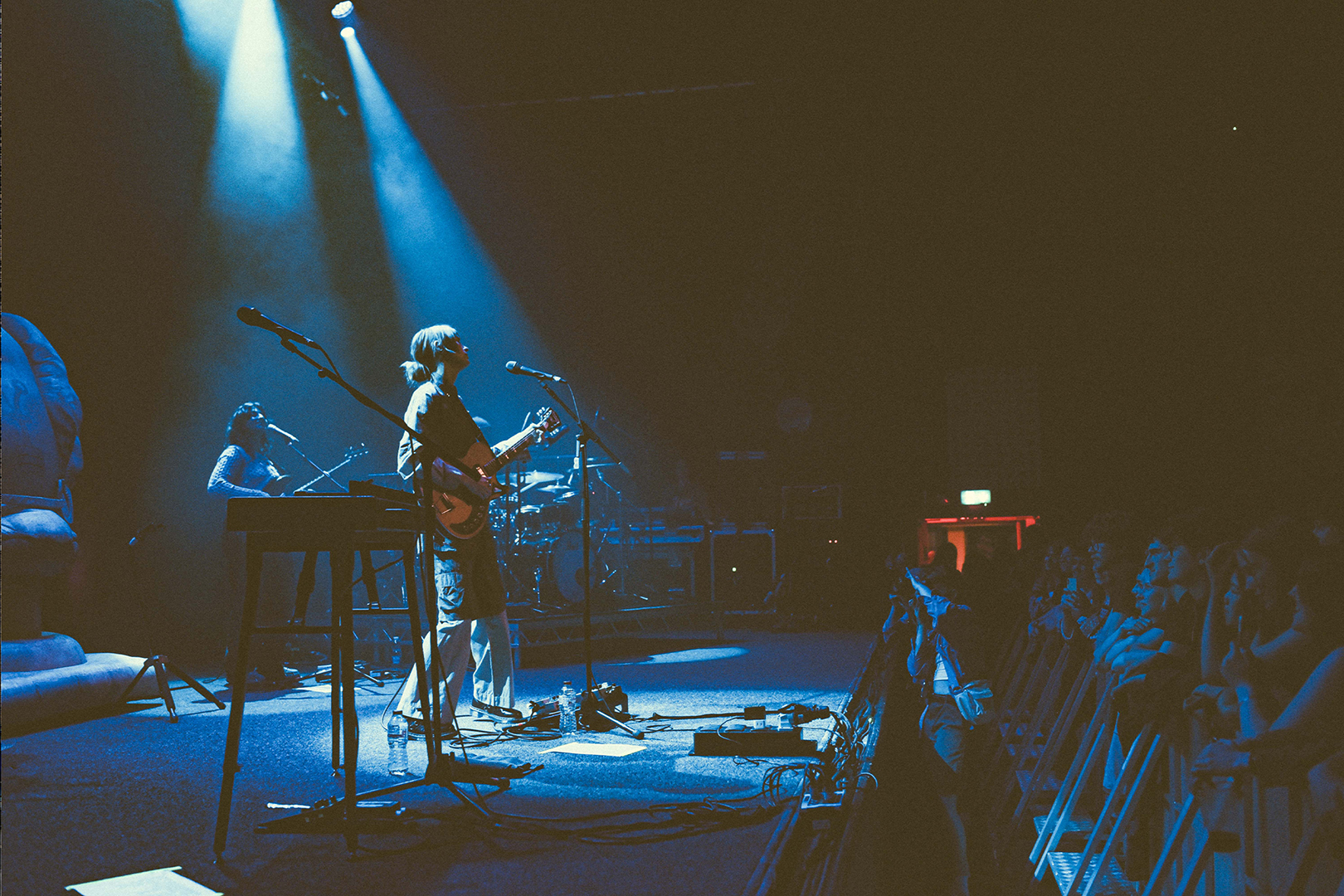 Faye Webster at Vicar Street. Copyright Miguel Ruiz.
Faye Webster at Vicar Street. Copyright Miguel Ruiz.At a time when emigration seems to be the looming threat over every young Irish person’s head, the trad scene has proven that, with further help from the government and suitable infrastructure, Dublin can continue to thrive and grow.
“It depends on what scene you’re in,” says Jonny exclaims, “but it’s just too good to leave!”
“It’s a lot different than the stuff I experienced in America,” Lorkin reveals. “A band would move into town and they’d stir a bit of energy in the community. But then they’d decide to move to Philly, or Portland or LA. People were always coming and going.
“What’s nice about Dublin is that a lot of people in the scene are from Dublin, and a great deal of acts come here and settle down. That’s remarkable when you think about it. I think it kind of ties back to the government’s funding, which gives the community a huge boost.”
• Featured in Hot Press "Best of Dublin" available down below
RELATED

- Lifestyle & Sports
- 16 Jan 25
Best of Dublin - My City - Steve Flynn

- Lifestyle & Sports
- 16 Jan 25
Best of Dublin – My City – Florence Okojie

- Lifestyle & Sports
- 15 Jan 25
Best of Dublin - Gráinne O’Keefe - Dublin's Best Bits
RELATED

- Lifestyle & Sports
- 15 Jan 25
Best of Dublin - An Epic Day-Out

- Lifestyle & Sports
- 15 Jan 25
Best of Dublin - Pizza Special

- Lifestyle & Sports
- 14 Jan 25
Best of Dublin - My City - Mick Medeiros

- Lifestyle & Sports
- 14 Jan 25
Best of Dublin - Rachel Galvo

- Lifestyle & Sports
- 13 Jan 25
Best of Dublin – My City – Oran O'Reilly

- Lifestyle & Sports
- 13 Jan 25

